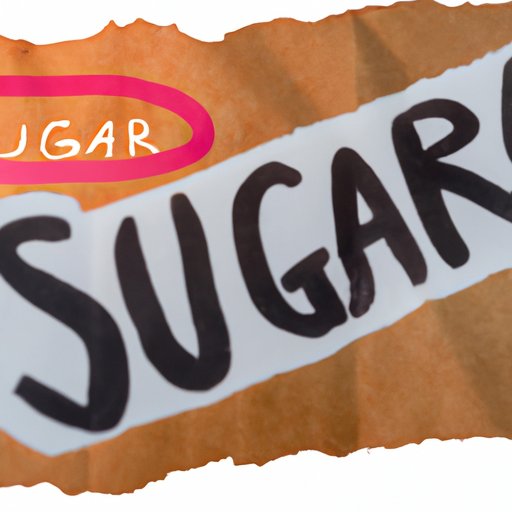
Introduction
Sugar is one of the most consumed food items in the world. Unfortunately, it is also one of the most harmful substances for our health. Sugar is linked to many health issues such as obesity, diabetes, and tooth decay. In this article, we will examine how much sugar you can consume in a day without harming your health and how to reduce your sugar intake.
How much sugar is recommended per day?
The recommended daily intake of sugar varies from organization to organization. The World Health Organization (WHO) recommends that you should consume no more than 10% of your daily calorie intake from added sugars. That means if you follow a 2000-calorie per day diet, you should consume no more than 50 grams (12 teaspoons) of sugar per day.
The American Heart Association (AHA), on the other hand, recommends that women should consume no more than 25 grams (6 teaspoons) per day and men should consume no more than 36 grams (9 teaspoons) per day.
Different types of sugar and their effects
Not all sugars are the same. There are two types of sugars – natural and added. Natural sugars are found in fruits, vegetables, and dairy products. Added sugars are sugars that are added to food and drinks during processing or preparation. Added sugars can be found in many food items such as cereals, soft drinks, flavored yogurts, and candies.
Added sugars can have a significant impact on the body. They can lead to weight gain and increase the risk of heart disease, type 2 diabetes, and cancer. Additionally, consuming large amounts of added sugars can cause tooth decay.
Reducing sugar intake
If you are looking to reduce your sugar intake, a gradual approach is the best way. Start by cutting back on sugary drinks such as soda, sweetened teas, and sports drinks. You can replace them with water, sparkling water, or unsweetened tea.
You can also replace sugary snacks with healthier options such as fruits, vegetables, or nuts. Additionally, you can reduce the amount of sugar you add to your coffee or tea.
Finally, it is essential to be mindful when consuming sugary foods and drinks. Be aware of how much sugar you are consuming, and try to avoid consuming them mindlessly.
Risks associated with consuming too much sugar
The consumption of too much sugar can have many negative impacts on health. One of the most known risks is tooth decay. When sugar mixes with bacteria in the mouth, it forms an acid that can damage the teeth. Additionally, consuming too much sugar can lead to weight gain and increase the risk of obesity.
Consuming large amounts of added sugars can also increase the risk of diabetes. The more sugar you consume, the more insulin your body produces to manage the sugar level in your bloodstream, which can lead to insulin resistance.
Reading nutrition labels and identifying hidden sugars
Reading nutrition labels is an essential aspect of reducing the amount of sugar you consume. Unfortunately, many processed foods such as canned fruits, pasta sauces, and salad dressings contain hidden sugars. Be sure to read the ingredient list and the sugar content listed on the label.
The most common hidden sugars are high fructose corn syrup, dextrose, and corn syrup. Foods labeled as low-fat or fat-free may contain higher amounts of sugar to improve the taste.
Healthy snacks and meals low in sugar
Reducing sugar intake does not mean compromising on taste or nutrition. There are many healthy snacks and meals that are low in sugar. Snacks such as apple slices with peanut butter, carrot sticks with hummus, and nuts are excellent alternatives to sugary snacks.
Additionally, fruits such as berries, grapes, and oranges are excellent choices for a low-sugar diet. When it comes to meals, grilled chicken with roasted vegetables, quinoa salad, and baked salmon are low-sugar options.
You can also sweeten your foods with natural sweeteners such as honey, maple syrup, or stevia.
Indulging in sweet treats in moderation
Indulging in sweet treats is not necessarily a bad thing. However, it is essential to consume them in moderation. You can enjoy a small portion of your favorite dessert once a week without compromising your health.
When you do indulge, be sure to savor every bite and enjoy the experience. You can also consider sharing your sweet treats with friends or family members.
Conclusion
The consumption of sugar can have a significant impact on health. It is crucial to be mindful of the amount of sugar you consume and look for healthy alternatives. Reading nutrition labels, reducing sugary drinks, and consuming natural sugars are excellent ways to reduce your sugar intake.
Call to action
Take the first step towards reducing your sugar intake by reading nutrition labels and cutting back on sugary drinks. Incorporate healthy, low-sugar snacks and meals into your diet, and indulge in sweet treats in moderation. Remember, small changes can lead to significant health benefits.





